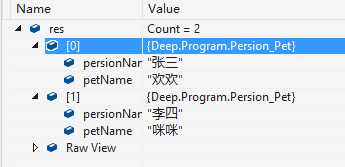c# Enumerable中Aggregate和Join的使用
Posted
tags:
篇首语:本文由小常识网(cha138.com)小编为大家整理,主要介绍了c# Enumerable中Aggregate和Join的使用相关的知识,希望对你有一定的参考价值。
参考页面:
http://www.yuanjiaocheng.net/entity/entitytypes.html
http://www.yuanjiaocheng.net/entity/entity-relations.html
http://www.yuanjiaocheng.net/entity/entity-lifecycle.html
http://www.yuanjiaocheng.net/entity/code-first.html
http://www.yuanjiaocheng.net/CSharp/csharprumenshili.html
直接上代码:

IEnumerable<int> list = Enumerable.Range(2, 10); int all = list.Aggregate((sum, index) => sum + index);
调试, 第一次调用,发现sum和index分别取列表的第1和第2个值:

F5下一步,发现把index加到sum了 (sum += index), 然后index取下一个值, 并累积到sum,重复此步骤直到取完列表中的值:

最后计算结果是65
另外2个重载函数:

int all = list.Aggregate(10, (sum, index) => sum + index);
第2个参数与上一个例子参数一样,累积列表中值,第1个参数是初始值, 会应用到累积值,在这里相当于用10加65,计算结果75。

bool is75 = list.Aggregate(10, (sum, index) => sum + index, res => res == 75);
第1第2个参数同上,第3个参数是对累积结果做判断,在这个例子里判断累积结果是否等于75,计算结果是true。
从中可以发现,list.Aggregate((sum, index) => sum + index)其实是list.Aggregate(0, (sum, index) => sum + index)的特例,相当于初始值为0而已。
===================
Join使用,看代码
Persion结构:

public struct Persion { public int index; public string name; public Persion(int index, string nm) { this.index = index; name = nm; } }
Pet结构:

public struct Pet { public string name; public Persion owner; public Pet(string name, Persion person) { this.name = name; owner = person; } }
Persion_Pet结构:

public struct Persion_Pet { public string persionName; public string petName; public Persion_Pet(string persion, string pet) { persionName = persion; petName = pet; } }
Join使用:

Persion p1 = new Persion(1, "张三"); Persion p2 = new Persion(2, "李四"); Persion p3 = new Persion(3, "路人甲"); List<Persion> people = new List<Persion>() { p1, p2, p3 }; Persion p4 = new Persion(4, "路人乙"); Pet dog = new Pet("欢欢", p1); Pet cat = new Pet("咪咪", p2); Pet cat2 = new Pet("cat2", p4); List<Pet> petList = new List<Pet>() { dog, cat, cat2 }; var res = people.Join(petList, persion => persion, pet => pet.owner, (persion, pet) => new Persion_Pet(persion.name, pet.name)).ToList();
结果:

关键在于join会比较第2个参数与第3个参数的返回值,只有相等时才会继续第4个参数。
以上是关于c# Enumerable中Aggregate和Join的使用的主要内容,如果未能解决你的问题,请参考以下文章
